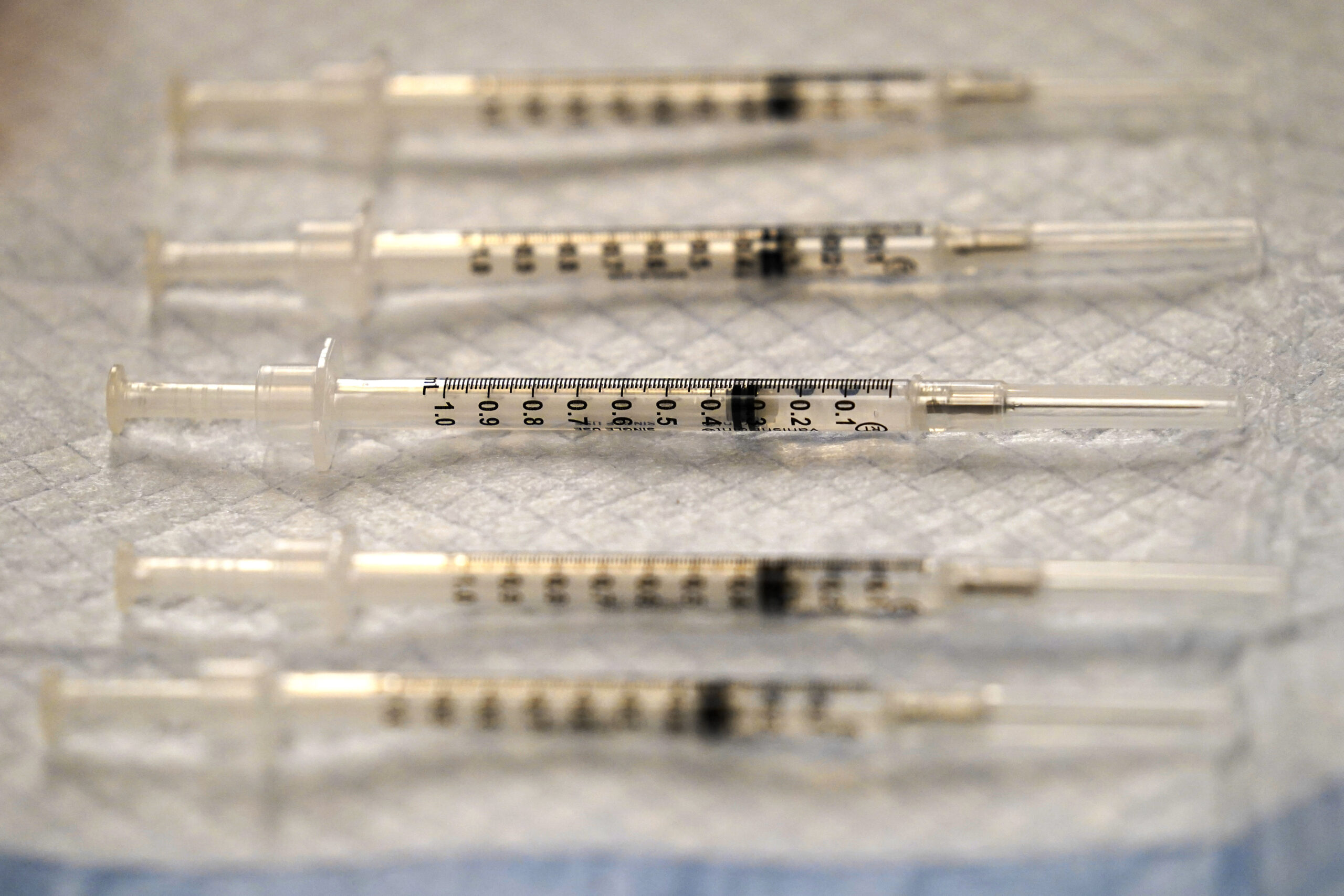Your COVID-19 Vaccine Questions Answered

WABE has partnered with America Amplified to gather and curate answers from experts to questions about the vaccine that are on the minds of public radio listeners across the country.
Nam Y. Huh / Associated Press
Updated Jan. 22 at 10:06 a.m.
As the national vaccination process begins, WABE has partnered with America Amplified to gather and curate answers from experts to questions on the minds of public radio listeners across the country. These questions come from WABE listeners and partner stations WITF in Pennsylvania, Side Effects Public Media in Indiana, St. Louis Public Radio and WUSF in Florida.
Send your questions to COVID19@wabe.org
Q: Where can if find information about vaccination locations in Georgia
A: The Georgia Department of Health has implemented a Vaccine Locator at https://dph.georgia.gov/locations/covid-vaccination-site
You can search by county for vaccine providers. Officials say supply maybe limited and appointments must be made to get vaccinated.
GETTING THE VACCINE
Q: I am an RN working in a primary care practice of 8 physicians. I am performing COVID swabs in our parking garage and our small staff of approximately 20 medical assistants interacts with patients in the clinic daily. We are not a hospital-owned clinic. How do our physicians and staff access COVID vaccines?
From the Georgia Department of Public Health:
A: Health care workers have several options for getting vaccinated. Health care workers affiliated with a health care system (hospital, clinic or private practice) or pharmacy should contact their respective facilities about the process for vaccinating eligible employees. Health care workers with access to a community hospital or pharmacy can seek vaccination there. Health care workers without access to these facilities – including those who have started the enrollment process to become a COVID-19 vaccine administration site but have not yet been approved – should contact their district health office (https://dph.georgia.gov/media/60761/download) for vaccination.
Q: There are different companies producing coronavirus vaccines. Will all of them require people to get two doses? And do they need two doses of the same vaccine? How will people avoid getting two different vaccines?
From William Schaffner MD, medical director of the National Foundation for Infectious Diseases.
A: The two current vaccines each require 2 doses. Other vaccines are being studied; one of them is a single-dose vaccine. You do need to have two doses of the same vaccine. Ideally, you should visit the same health practitioner who will be keeping a record of who is vaccinated with which vaccine.
Q: I am a 68-year-old snowbird that lives in Florida from November to April. However, I am a Pennsylvania resident. Will I be able to receive a vaccination in Florida when it is available for elderly people?
From William Schaffner MD, medical director of the National Foundation for Infectious Diseases.
A: The short answer is yes. You should be able to get the vaccine in Florida when it is available. But be mindful that you have to get 2 doses separated by 3 weeks and it has to be the same vaccine (i.e. Pfizer or Moderna). It would be most advisable for you to go back to the same provider because the records there will be the clearest and there will be no confusion. If you get the first vaccine in Florida, stay there for 3 weeks to get the second vaccine there as well.
Q: I am 65 and live in a 55-plus community. When do you feel I can realistically expect to be able to get the vaccine?
From William Schaffner MD, medical director of the National Foundation for Infectious Diseases.
A: The determining factor will be your age, not your community. You’ll be in the second or third group to receive a vaccine, likely by sometime this spring. We know healthcare providers are first, and then residents of long-term care facilities. We are waiting on advice from the CDC Advisory Committee on who should go next — essential workers, or people who are 65 or older.
Q: Does your visa status affect the chances of you getting the vaccine?
From Dr. Mary Anne Jackson, Dean of UMKC Medical School and a member of the National Vaccine Advisory Committee
A: There are no restrictions on vaccine provisions to anyone on a visa.
Q: When will Teachers we eligible to get the Vaccine in Georgia?
A: Teachers in Georgia will be in group 1B that includes essential workers, but state officials say they don’t know yet when it will be that group’s turn. Georgia is still in group 1 A.
More info on the groups is here.
https://dph.georgia.gov/covid-vaccine
Q: Wellstar (area health system) is offering appointments for some of its patients to receive the first dosage. I’m ambivalent mainly because they cannot guarantee the 2nd dosage in a timely way. Given that the vaccine has 95% efficacy with BOTH dosages, what is gained by getting the 1st dosage without the assurance of the 2nd?
A: From the Learn About COVID-19 Health Desk. The 2 COVID-19 vaccines that have been authorized for emergency use — the Moderna and Pfizer vaccines — are designed to have two doses. It is important to get both doses to maximize protection. On January 4, 2021, the FDA issued a statement, saying, “at this time, suggesting changes to the FDA-authorized dosing or schedules of these vaccines is premature and not rooted solidly in the available evidence.” More research is being done to help answer the question about how beneficial it is to change a recommended vaccine dosing schedule in order to stretch limited supplies to as many people as possible.
WHAT ARE THE SIDE EFFECTS AND EFFECTS ON SPREADING THE VIRUS?
Q: [What are the] side effects [from the vaccines] for people with underlying health issues. Do they even know?
From Dr. William Moss, executive director of the International Vaccine Access Center.
A: Both [Pfizer and Moderna vaccines] use messenger RNA technology, a really novel vaccine platform. …There still remain many questions to be answered as we go forward. At this juncture, we’re only going to know about short-term side effects, but we need to know whether there are any potential rare, long-term side effects. Short-term side effects that we know of now appear in about 5% to 15% of participants. They include inflammation, soreness at the injection site, a low-grade fever, headaches, muscle aches and fatigue. These can last from 12 to 36 hours after vaccination.
Q: Can I get COVID-19 from the vaccine?
From Side Effects Public Media
A: No. The COVID-19 vaccine doses developed by Pfizer-BioNTech and Moderna … have been in development for about three decades, but are only now being used for COVID-19. According to the CDC, mRNA vaccines teach your cells how to make a protein – or even just a piece of a protein – that triggers an immune response inside our bodies. That immune response, which produces antibodies, is what protects you from getting infected if the real virus enters our bodies.
Q: Do I still have to wear a mask once I have the vaccine?
From Side Effects Public Media
A: Yes. According to NPR’s Shots, studies of the new vaccines only measured whether vaccinated people developed symptoms, not whether they got infected. It’s possible that they got mild infections — not enough to make them ill, but enough to pass the virus on to others. The CDC is calling for those who are immunized to continue wearing masks and practicing safe physical distancing until more is learned.
Q: How is the vaccine put together and what are its elements?
A: We found a good explanation in this video from Georgia Tech.
Q: Does a person who has had a positive COVID-19 test need to received the vaccine? plus does a person who has tested positive for coronavirus antibodies need to receive the vaccine?
A: From Meedan’s Digital Health Lab’s learnaboutcovid19.org: Positive COVID-19 antibody tests and a prior COVID-19 infections do not guarantee immunity to the virus, making the COVID-19 vaccine recommended for individuals who have tested positive for the COVID-19 virus and/or for COVID-19 antibodies. Read more here.
Q: How long are people who have tested positive for COVID-19 protected from subsequent coronavirus infections? If they are reinfected, will their disease process be milder?
A: From Meedan’s Digital Health Lab’s learnaboutcovid19.org, a global team of public health experts: We are still learning a lot about what kind of natural defense, also known as immunity, a person has after being infected with COVID-19, and how long that immunity lasts. A small number of people have reportedly become reinfected with the virus following an initial infection and research is ongoing. Currently researchers believe that most people will be protected from reinfection for up to six months following infection. Read more here.
WHAT IF I’M IMMUNOCOMPROMISED OR HAVE OTHER PRE-EXISTING CONDITIONS?
Q: I have had hives all over my face and body and puffy lips from shellfish. Should I take Benadryl before the COVID vaccination?
A: From SideEffects Public Media
If you’ve had allergic reactions to vaccines in the past, you should talk to your primary care provider about the vaccine. People who have had severe allergic reactions may need to be monitored after receiving the vaccine. Polyethylene glycol has been pointed to as what has triggered some anaphylaxis.
The most common allergic reaction — especially in flu shots — are in people with egg allergies. The most common flu vaccines are developed with egg-based technology, but the FDA and CDC said common food allergies and medicines shouldn’t prevent most people from receiving the vaccine.
Q: Is it safe for patients with autoimmune disease who take immunosuppressive medications to be vaccinated against COVID? Is it effective?
From Dr. William Moss, executive director of the International Vaccine Access Center.
A: There’s no doubt that we’re going to have to look very carefully at data on both the safety and efficacy because that too can be impaired in immunocompromised individuals. The vaccines that are typically not recommended routinely for severely immunocompromised individuals are what we call attenuated viral vaccines, where we take the natural virus and make it weaker. And this is a very old way of making vaccines. But for example, our measles, mumps, and rubella vaccines are attenuated viral vaccines. None of the front runners for COVID-19 or SARS-CoV-2 are that type of vaccine. So I don’t anticipate problems with safety … but that will need to be studied going forward.
Q: Should organ (liver) transplant recipients who are taking anti-rejection medications (Prograf/Tacrolimus) be vaccinated for COVID-19?
From William Schaffner MD, medical director of the National Foundation for Infectious Diseases.
A: The short answer is yes. Although this population hasn’t been studied, we don’t think there is any chance of harm. It may be that the immune response is somewhat blunted, but it could do some good. The CDC advisory committee said it probably won’t hurt but it might help.
Q: Do any of the manufacturers know if their vaccine is safe for people with HIV?
From William Schaffner MD, medical director of the National Foundation for Infectious Diseases.
A: It probably won’t hurt, but it could help. The second vaccine in line — the Moderna vaccine — included a small study of people with HIV infection and we expect to see that data shortly. But in the meantime, if people with HIV are offered the Pfizer vaccine they should take it.
Q: I am a health care worker. I will be 62 years old next month. I have intrinsic asthma maybe twice a year. Can I/should I prep for the vaccine with just Benadryl? I have taken the influenza vaccine for the last 2 years without issue or prep.
From William Schaffner MD, medical director of the National Foundation for Infectious Diseases.
A: No preparation is necessary for someone with asthma. That person should have the same sort of response of any 62-year-old without asthma.
Q: WILL I HAVE TO PAY FOR THE VACCINE?
From Side Effects Public Media
A: No. Vaccine providers will be able to bill insurance for a fee to administer the vaccine, but will not be able to charge you. They can seek reimbursement for uninsured patients from the Health Resources and Services Administration’s Provider Relief Fund.
Q: WHAT’S THE RESEARCH ON HOW IT AFFECTS BREASTFEEDING MOTHERS?
From Meedan’s Digital Health Lab’s learnaboutcovid19.org, a global team of public health experts
A: None of the three leading vaccines manufacturers (Pfizer, Moderna, and AstraZeneca) has reported data … on knowingly pregnant or breastfeeding individuals. As a result, we have a limited understanding of how effective the three leading vaccines are for pregnant and breastfeeding people, and if there are risks specific to them.
Before more data is available, it is best for pregnant and breastfeeding individuals to speak with their doctors about the best way to proceed. While it is unlikely that a doctor would recommend a pregnant or breastfeeding person get vaccinated before more data is available, every risk profile is different and is worth discussing with a care provider.
EMPLOYER’S RESPONSIBILITY
Q: What responsibility does an employer have to all its employees when an employee tests COVID positive? Aren’t they obligated to inform everyone? No employer can possibly know all the employees the infected employee came in contact with!
From Zack Flood, an associate attorney specializing in labor and employment law, and Bob Simandl, chair of the Labor and Employment Group, both at the Milwaukee-based law firm von Briesen & Roper.
A: Zack Flood: There is a patchwork of state and local guidance across the country with regards to employer responsibilities. The most important thing is the general duty under federal Occupational Health and Safety Administration laws to create and maintain a safe workplace. The employer’s responsibility to other employees when they find out that they have a positive test is first to make sure that person is not coming into work, because that is going to create a threat. But also communicating to the rest of the workforce that there has been a positive test, but not disclosing the identity of that employee. The identity of the individual must be kept confidential.
Bob Simandl: The employer should already have a policy that addresses what its role will be as it relates to an employee testing positive and in communicating with fellow employees about the risk and ways to remain safe. The overarching responsibility for the employer is to provide a safe workplace and to keep employees informed about those policies. The employer needs to communicate with employees where the exposure took place and how they are working with authorities to safeguard employees and families. Ultimately there has to be a post-mortem done on how the policy worked.
Q: Will children be receiving doses of the vaccine? What is a projected timeline for the administration to children/toddlers?
From William Schaffner MD, medical director of the National Foundation for Infectious Diseases. A: Trials in children are now beginning and we should have results in mid-summer in terms of safety and doses appropriate for children. Children are not free of the complications of this disease, but they are much less apt to get the serious complications that we see in older adults. We are hitting populations most severely affected first and, when we get the data, we will expand the vaccine to the children. In the meantime, essential workers who should receive the vaccine soon include those who work in schools – teachers, cooks, custodians. That will provide a sigh of relief if we can get those people vaccinated and the kids back in school.
Q: What will be the process for administration of vaccines for phase 1B and 1C — and beyond? Will people need to request the vaccine through a primary care physician? Local health department?
From William Schaffner MD, medical director of the National Foundation for Infectious Diseases.
A: The first phase of vaccine distribution was to health care providers on the frontlines at major medical centers, and people in long term care facilities. The second group, people 75 and older and essential workers, are much harder to identify. Different states are already deviating from the CDC guidelines and distributing the vaccine differently. We hope the Moderna vaccine – which doesn’t have to be stored at super cool temperatures — will soon find its way to doctor’s offices, pharmacies and local health departments. We think towards the end of this month and through the early spring the Moderna vaccine will be out there in the community and you should be able to request an appointment or even drop in and get a vaccine.
Q: The vaccines show 94-95% effectiveness. What were the outcomes for the 5-6% of people for whom the vaccines were ineffective?
From William Schaffner MD, medical director of the National Foundation for Infectious Diseases.
A: In these large clinical trials, half the people got the vaccine, the other half got a placebo. Let’s say in the placebo group,100 people got sick. But in the vaccine group, only 5 got sick. That’s how we calculate the effectiveness. The 5-6% of people for whom the vaccine was ineffective contracted COVID to some degree or another.
Q: Does a person who has had a positive COVID-19 test need to receive the vaccine? plus does a person who has tested positive for coronavirus antibodies need to receive the vaccine?
From Meedan’s Digital Health Lab’s learnaboutcovid19.org:
A: Positive COVID-19 antibody tests and a prior COVID-19 infections do not guarantee immunity to the virus, making the COVID-19 vaccine recommended for individuals who have tested positive for the COVID-19 virus and/or for COVID-19 antibodies. Read more here.
Q: How long are people who have tested positive for COVID-19 protected from subsequent coronavirus infections? If they are reinfected, will their disease process be milder?
From Meedan’s Digital Health Lab’s learnaboutcovid19.org
A: We are still learning a lot about what kind of natural defense, also known as immunity, a person has after being infected with COVID-19, and how long that immunity lasts. A small number of people have reportedly become reinfected with the virus following an initial infection and research is ongoing. Currently researchers believe that most people will be protected from reinfection for up to six months following infection. Read more here.
Q: Why is Janssen starting a trial with 2 doses now? Was the effectiveness of the single dose vaccine disappointing?
From the Learn About COVID-19 Health Desk.
A: Janssen Pharmaceuticals designed a COVID-19 vaccine candidate to be delivered in a one-dose regimen. The company also started a clinical trial for a two-dose regimen that is intended to be complementary to the ongoing clinical trial for the one-dose regimen, in case two doses have the ‘’potential to offer enhanced durability in some participants.’” Due to the urgent nature of the COVID-19 global pandemic, many phases of vaccine development and testing have been implemented in parallel. Scientists will be able to say more about the effectiveness of the one-dose and two dose regimens after more data from the parallel phase 3 trials become available.
Q: What happened to the miracle pill EIDD-2801? This is intended to cure Covid-19 and it is no longer discussed in the media.
From the Learn About COVID-19 Health Desk.
A: EIDD-2801, also called Molnupiravir, is an oral antiviral drug that was developed by the Emory Institute for Drug Development (EIDD). It was originally developed to treat influenza. It is in Phase II/III of its clinical trials as a treatment for SARS-CoV-2 infection. Similar in function to Remdesivir, EIDD-2801 targets the enzymes in the COVID-19 virus and replaces them with another compound. This switching creates mutations in the virus that make it incapable of functioning.
Q: I have read extensively on mRNA vaccine technology but have not been able to find information about what cell types in the body take up the mRNA after it is injected. I assume dendritic cells located at the injection site are important for taking up the mRNA and presenting the antigen once it’s produced by the cell. Are these vaccines designed to target dendritic cells only, or does the mRNA enter all cell types (such as muscle and nerve cells)? If so, would there be any potential for an adverse outcome if cells other than immune cells are producing the spike protein? Could the protein accumulate in the cells and damage them?
From the Learn About COVID-19 Health Desk.
A: mRNA vaccines like the Pfizer and Moderna vaccines interact with multiple types of cells once they enter the human body, including immune cells, which are the cells that launch a response to the virus and help us build immunity to COVID-19. Additionally, “T-follicular helper cells” (T cells) are a type of immune cell that is activated by the mRNA vaccine. “Germinal center B cell responses” (GC B cells) are also activated by the mRNA vaccine.
mRNA vaccines also interact with dendritic cells. Dendritic cells help our bodies with transporting foreign invaders, like a virus or a vaccine, to the body’s immune-boosting T cells, so that we can build up immunity to that foreign invader. Lastly, the mRNA vaccines also interact with cells in our muscles when the vaccine is injected.
Q: I am wondering about the efficacy claims in the Pfizer vaccine trial. Were the participants being serial tested for COVID-19 or were only symptomatic cases reported as positives? I’m basically trying to find out if the study captured all of the potentially asymptomatic patients with Covid 19.
From the Learn About COVID-19 Health Desk.
A: Clinical trial researchers have standard definitions for routinely detecting COVID-19 cases for both symptomatic and asymptomatic individuals. COVID-19 cases are recognized by the presence of one or more symptoms and a positive test; asymptomatic individuals are tested for COVID-19 antibodies. A positive asymptomatic case is defined as the presence of antibodies in an individual who had a prior negative test








